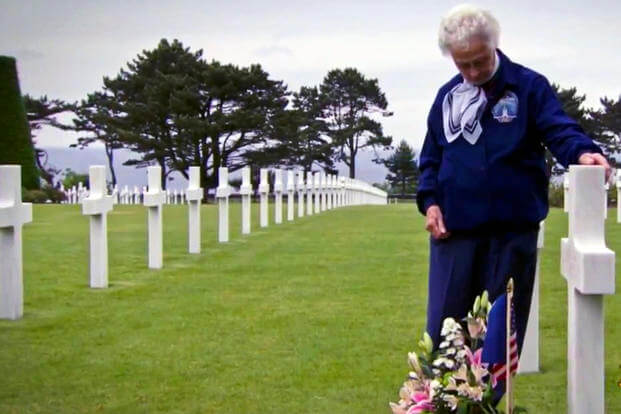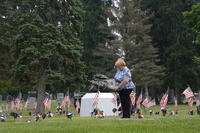The following benefits are available to surviving family members of veterans or those who died on active duty.
Basic Allowance for Housing
The spouse and children of a deceased service member living in government quarters are entitled to either remain in government housing for up to one year, or to relocate to private quarters and receive up to a year of Basic Allowance for Housing (BAH) or Overseas Housing Allowance (OHA) as appropriate. To receive this allowance for private quarters, the service member must have been eligible to receive those allowances at the time of death.
Educational Benefits and Assistance
Spouse and Dependents Education Assistance Program
The Dependents' Educational Assistance (DEA) program provides education and training benefits to eligible dependents of veterans who died in service, as a result of injuries or disabilities receive in service, or who is permanently and totally disabled as a result of their service.
The program offers up to 45 months of education benefits. These benefits may be used for degree and certificate programs, apprenticeship, and on-the-job training. If you are a spouse, you may also take a correspondence course. Remedial, deficiency, and refresher courses may be approved under certain circumstances. Click here to learn more about the Dependents Education Assistance Program.
Marine GySgt John D. Fry Scholarship
The Fry Scholarship pays benefits equal to the Post-9/11 GI Bill for survivors of service members who dies in the line of duty after Sept. 10, 2001. Click here to learn more about the Fry Scholarship Program.
Scholarships
Scholarship assistance for dependent survivors of deceased members is provided by many schools, colleges, special scholarship funds, and by state laws. While such assistance is usually provided only for persons needing financial assistance, some aid may be furnished regardless of need. This is particularly true of state benefits. Additional information on this subject may be obtained from VA or your local state veterans affairs department.
Find more cash for school or get the lowdown on scholarships and education help available for your family. FastWeb can help. Visit FastWeb.com to have education tips and benefits updates delivered directly to your inbox.
Federal Employment
Surviving spouses who have not remarried, and certain mothers of deceased members, who served during a war period, are entitled to an additional ten points to their earned rating on the civil service examination. Other benefits with respect to appointment and retention are also available. Information concerning preference eligibility may be obtained from the Office of Personnel Management, State Employment Office, or the local post office.
Social Security Benefits
Any benefits you may receive from the Social Security Administration (SSA) are administered by that agency independent of any benefits you receive through the military. You should contact the SSA as soon as possible after the service member's death so that your long term benefits can start as soon as possible. Within 30-90 days, SSA will pay to a surviving spouse or children a $255 lump sum death payment and will provide other monthly benefits to surviving family member. The amount of those benefits depends on how long the service member worked and contributed through Federal Insurance Contributions Act (FICA) payroll deductions.
If the member died on active duty, your Casualty Assistance Officer will provide you with the claim application form and will help you arrange for an appointment. The CACO will also accompany you to that meeting if you wish.
You may also contact the SSA for more information about this benefit at 800-772-1213. SSA claims are usually settled within 60-90 days from the date the SSA receives the claim.
State Benefits
Many states provide benefits for survivors of veterans such as educational assistance, land settlement preference, civil service preference, tax and license fee exemptions, loans, relief and rehabilitation, employment assistance and bonuses. State Veterans Commissions usually supervise these programs and may be contacted for additional information.
Unpaid Compensation
The designated beneficiary will receive any unpaid compensation due the service member on date of death. If no beneficiary was designated, then the recipient will be the surviving spouse. If there is no spouse, then any surviving children on their descendants will receive the funds in equal shares. If there are no children, then the parents of the service member will receive the funds. If there are no parents, then the funds will be distributed either to the person appointed to represent the member's estate or, if no representative was appointed then according to the state probate laws governing the service member's estate.
Uniformed Services Identification and Privilege Card (DD Form 1173)
The Uniformed Services Identification and Privilege Card identifies the holder as an authorized patron for privileges indicated on the card. Dependents over the age of 10 must have a card to gain access to facilities such as the commissary and exchange, or to obtain medical care at a government facility or through a civilian care facility, base theater privileges and so forth. As the surviving dependent of a deceased member your present card expires of the date of the member's death. You must renew this card within 30 days of the member's death in order to continue to have access to the aforementioned privileges.
The Casualty Assistance Officer will assist you in receiving a new card and will accompany you to the nearest Real-Time Automated Personnel Identification System (RAPIDS) site or other military installation authorized to issue ID cards. You should take the old ID card along with a copy of the DD Form 1300 to the issuing office. You may use your old card for identification until a card is obtained.
Keep Up with the Ins and Outs of Military Life
For the latest military news and tips on military family benefits and more, subscribe to Military.com and have the information you need delivered directly to your inbox.












